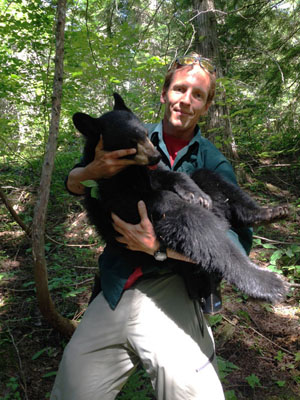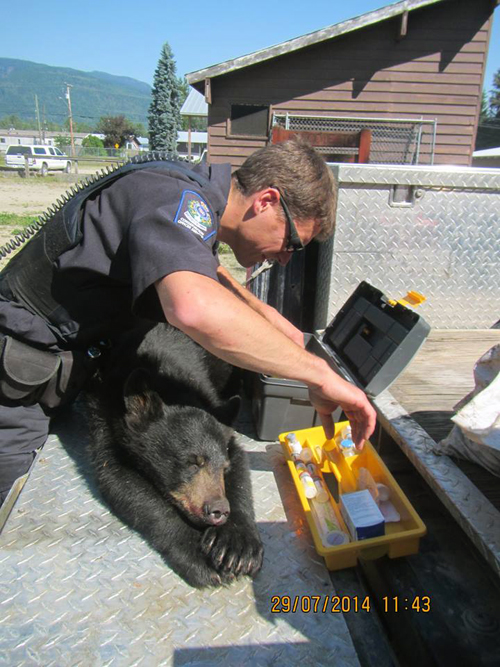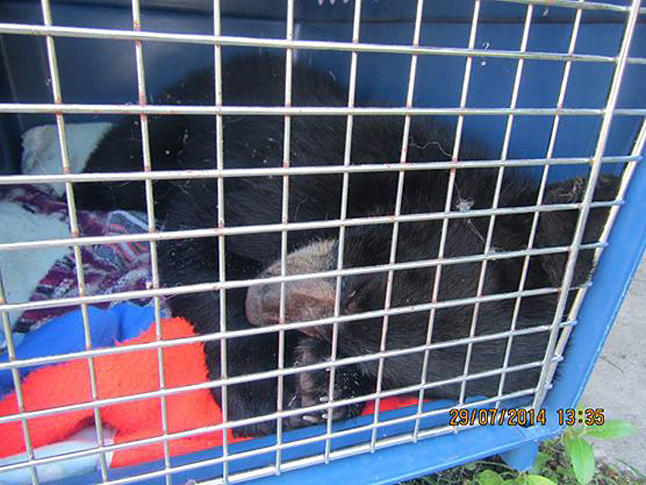
By David F. Rooney
Parks Canada and the BC Conservation Officer Service enjoyed a bittersweet wildlife moment on Tuesday, July 29.
“It’s really a feel-good bear story,” said Conservation Officer Alex Desjardins when he was contacted by The Current.
He said a Parks Canada employee was cycling to work from Greeley Road before 6:45 am when she noticed the carcass of a black bear sow lying in the ditch along the Trans-Canada about six kilometres east of town and just 700 metres outside the boundary of Mount Revelstoke National Park. Near it, she spotted a distressed cub.
“It was actually the movement of the cub that caught my eye,” Laurie Booker said in a telephone interview.
There was no blood on the pavement so she thinks the mother was hit by a car and either staggered to the ditch where she expired or was knocked into it by the vehicle that struck her. Either way Laurie was glad she spotted the newly orphaned cub.
“I’m very happy with the outcome,” she said. “The cub might not have lived long (without its mother).”
She was also happy to see the level of cooperation that exists between Parks Canada and the Conservation Officer Service, particularly since Revelstoke no longer has its own CO.
The Golden-based Desjardins was summoned to the scene as was Michel Beauchemin, a Resource Conservation Specialist with Parks Canada.
The distressed cub was likely born in February or March, Desjardins said, and would not be able to survive on its own.
The creature was sedated, examined and caged for a journey to the Northern Lights Wildlife Society in Smithers where it will be cared for through the society’s juvenile rehabilitation program.
This cub is lucky. Most cubs that are orphaned in their first year won’t survive without human assistance. And even after it reaches maturity the world remains a dangerous place — particularly around human towns and cities.

Each year in British Columbia, nearly 950 black bears and 50 grizzly bears are destroyed due to conflicts between people and bears. You can reduce this number by using these 10 tips to bear-proof your home:
- Keep garbage in the house, garage or shed until pick-up day;
- Don’t add meat products or cooked food to compost, turn it regularly and keep it covered;
- Pick ripe and fallen fruit daily;
- Remove unused fruit trees;
- Use birdfeeders only in winter;
- Keep ground free of birdseed;
- Clean your barbeque grill after each use;
- Cover and store it in a secure area;
- Bring pet dishes inside and clean up any spillage; and
- Store pet food indoors.
If you see a bear:
- Remain calm — don’t panic; Keep away from the bear and bring your children and pets indoors;
- Never approach the bear and do not run from it;
- Warn others of the bear’s presence, without yelling;
- Once the bear has left, check your yard to ensure there are no attractants available; and
- If the bear appears threatening call the Conservation Officer Service at 1-877-952-RAPP (7277) or local police. For more information on being bear aware check the Revelstoke Bear Aware website.
Please click here to read about the proper reaction to a bear encounter in the wild.
Please click here to read about the proper reaction to a bear encounter at your home.




